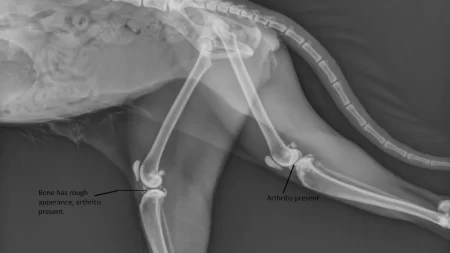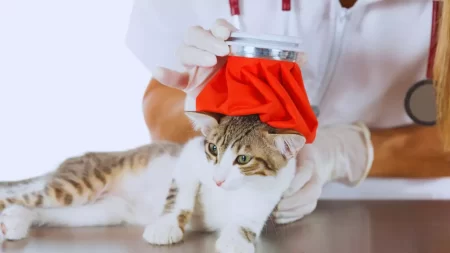If cats don’t undergo surgery, they usually have to be put down in one to three months as the tumors cause eating problems. Even though the tumors spread gradually, it’s advisable to think about surgery. For instance, surgery can help prevent the tumors from spreading and enable cats to eat comfortably.
Euthanizing a beloved pet is not something easy to decide. If your cat has a brain tumor and you’re not sure if it’s time to say goodbye, you are not the only one. You may have to make the tough choice of whether to euthanize your kitty. This article will help you make the best decision for your cat.
Cats can develop diverse tumors, and brain tumors can be particularly dangerous. Treating them is hard, but there are options that pet owners can consider once diagnosed.
Brain tumors in cats differ in form, size, and severity. Some cats only have one, while others may have many across the brain and spine. Depending on its characteristics, the tumor can impede a cat’s motor activity or cognitive functions, leading to dangerous consequences.
Typical signs of brain tumors in cats include:
- strange behaviors
- seizures
- indifference to activities they used to enjoy
- blindness/vision problems
- lethargy
- confusion
If your cat has been diagnosed with a brain tumor, you need to understand the treatments available. Surgery, radiation therapy, chemotherapy, and palliative care are all options. Palliative care can provide relief, but isn’t a cure. The best course of action depends on the individual cat’s needs, so talk to your vet to discuss all possibilities.
How to determine if a cat’s brain tumor is causing significant pain or discomfort?
There are a few indicators that can suggest whether a cat with a brain tumor is experiencing significant discomfort or pain. These indicators consist of:
- Alterations in behavior: If your cat is displaying dissimilar behavior than usual, this might signify that they are experiencing discomfort or pain. For instance, they may appear more lethargic, less keen on playing or interacting with you, or avoid certain activities they formerly enjoyed.
- Alterations in appetite or drinking habits: Brain tumors may influence a cat’s sense of smell and taste, leading to a reduction in appetite or water intake. If your cat’s eating or drinking behaviors have undergone significant changes, this could be an indicator of discomfort.
- Alterations in vocalization: Cats frequently meow or cry more than usual when they are in discomfort or pain. If your cat is vocalizing more frequently or in a different way than they usually do, this may be a sign that they are experiencing discomfort.
- Physical symptoms: A few physical indications that could suggest discomfort or pain in a cat with a brain tumor include restlessness, pacing, panting, trembling, and hiding.
If you notice any of these signs, it’s critical to take your cat to a veterinarian as soon as feasible. The vet can examine your cat and determine whether they are experiencing discomfort or pain and what can be done to alleviate it.
Causes and Risk Factors of Cat Brain Tumors
Brain tumors in cats can be caused by a variety of factors. Genetics, toxins, viruses, and radiation may all increase the risk. However, we still don’t know all the causes.
Primary brain tumors come from the brain tissue. Secondary tumors start somewhere else in the body before spreading to the brain. It’s tough to diagnose both types.
Symptoms depend on the tumor’s type and location. Common signs are seizures, head tilting, behavioral changes, changes to vision/hearing, decreased appetite, vomiting/diarrhea, and pressure in their skull. A vet will use scans to diagnose and decide a treatment plan.
What are the common symptoms of a cat brain tumor and when should euthanasia be considered?
When your cat is diagnosed with a brain tumor, there’s no way to know how long they will live. Some may last a few weeks or months, while others may last longer. The most important thing is to recognize when the pain outweighs the quality of life for your pet.
It can be hard to make this decision. Monitor the following symptoms closely in order to provide your cat with compassionate end-of-life care at the right time:
- Behavioral changes can be a sign of a brain tumor. Your cat may become confused or disoriented and act differently to environmental stimuli. They may also have trouble chasing after toys and playing. Seizures can occur, as can vision problems.
- If your cat becomes lethargic and stops enjoying their daily routine, humane euthanasia may be necessary. This prevents suffering from unmanageable pain or discomfort.
Diagnosing Cat Brain Tumors
Has your feline friend been exhibiting any strange signs? Seizures, disorientation, depression, or behavioral and physical changes? If so, it’s time to visit your vet! They can give your kitty a neurological exam to check for a brain tumor.
Diagnostic tests, like a cerebral spinal fluid analysis, MRI, CT scan, and biopsy may also be ordered. The size and location of the tumor, your cat’s age and health, will all affect the diagnosis.
In some mild cases, symptoms like balance deficits may be present, but hard to detect without tests. If the brain tumor is treatable, surgery and radiation therapy might be available.
However, if the situation is more serious, you and the vet may need to consider euthanasia. It’s important to discuss all treatment options as soon as possible so that you can make informed decisions about your pet’s care.
Is there any hope for treating a cat brain tumor or should euthanasia be considered immediately?
Brain tumors in cats may be treated with surgery, chemo, or radiation. The type of tumor, if it’s spread, and other risks will decide if treatment is possible. Surgery is the most popular. But, it might not work for every cat. Chemo can follow surgery to kill any residual cancer cells. Radiation therapy can be used together with chemo to target certain parts of the brain and to reduce chemo side effects.
Before treatment, a vet must discuss it in detail. Some tumors may have better outcomes with one type of treatment. Prognosis must also affect decisions, as follow-up care depends on outlooks. In some cases, cats become too weak or ill to do aggressive treatments, or they have severe side effects that make treatment not possible. When providing quality care isn’t feasible, euthanasia may need to be seriously considered.
Prognosis for Cat Brain Tumors
Brain tumors in cats have variable prognoses. Factors like tumor type, location, and cat health are important. The most common are meningiomas, gliomas, and miscellaneous masses.
- Meningiomas tend to grow slowly. In areas not affecting activities, corticosteroids or radiation therapy can work well.
- Gliomas spread quickly and may need treatment quickly. Surgery or radiation may be necessary.
- Miscellaneous masses vary in behavior. Medication or surgery may be possible, depending on size. Any mass near vital structures should be treated carefully, due to potential long-term effects.
Euthanasia should be considered after consulting a veterinarian experienced in neurology. All info on cat health and tumor type must be taken into account.
When to Euthanize a Cat With a Brain Tumor?
Deciding when to euthanize a pet can be tough. If your cat has a brain tumor, it’s important to understand your options and the progression of the disease. Signs and progress can vary, so it’s not always easy to know when it’s time.
Most cats with brain tumors will show neurologic or behavior changes. Your vet may suggest treatment for these symptoms, like radiation or chemotherapy. Treatment will usually keep symptoms at bay for a while but most cats have 6 months or less of poor-quality life expectancy after diagnosis.
When deterioration reaches a point where euthanasia should be considered, signs include:
- Seizures that don’t respond to medication
- Inability to eat
- Confusion/disorientation
- Recurrence of neurologic deficits
- Lack of response to treatments
- Intense discomfort/pain
It’s best to talk to your vet for advice on what’s best for you and your pet’s situation.
How can pet owners prepare emotionally and practically for the decision to euthanize a cat with a brain tumor?
Brain tumors are a frequent cause of death for pets. Coping with the loss of a beloved pet can be rough. Here are some tips to assist you:
- Recognize your feelings: Whether you feel sad, angry, overwhelmed, or numb; these reactions are all normal. Give yourself time to manage them.
- Talk about it: Telling stories and memories can be helpful in dealing with the grieving process. Speak to family members, friends, and other pet owners. They may have gone through the same thing or simply offer sympathy and understanding.
- Let yourself heal: Healing takes time and there is no set timeline. Some days can be tough while others may be easier. Allow yourself moments to grieve, but don’t stay stuck in sadness. Honor your pet’s life by doing activities that bring joy like walks or visiting their favorite places one last time.
Ask for help: If self-care isn’t enough, search for professional help. There are many support groups online or through animal charities. They are dedicated to helping people cope after the loss of their beloved pets.







